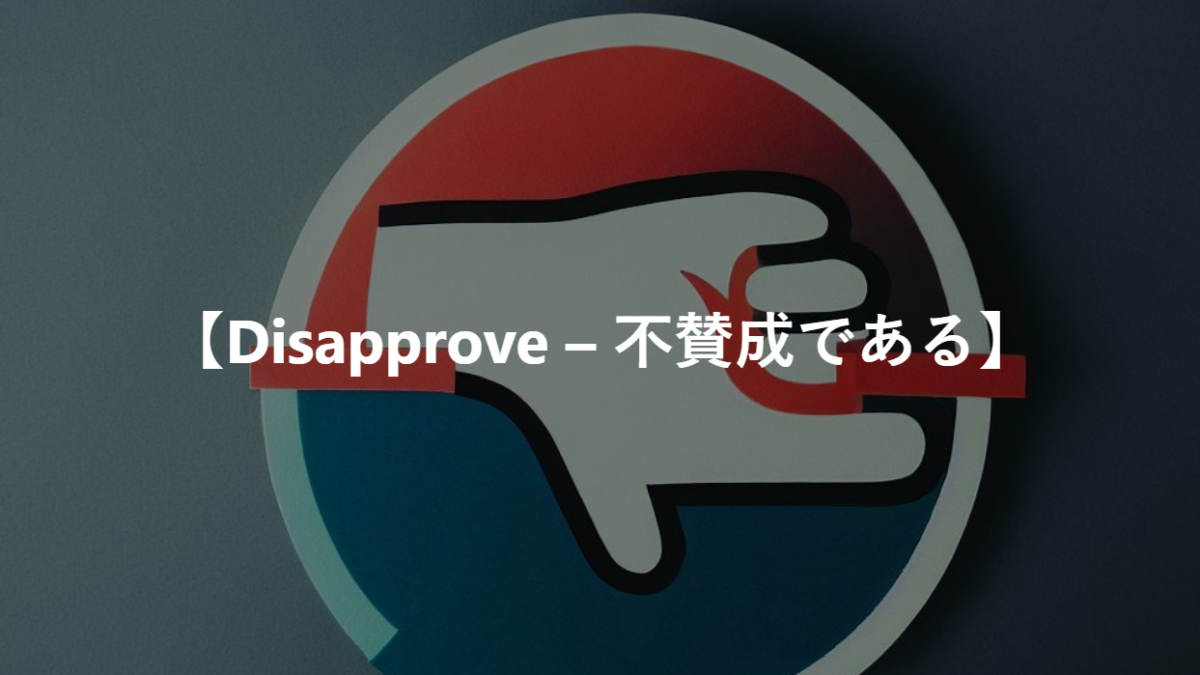語源・類義語・反対語・例文
【Disapprove – 不賛成である】という単語の語源とか由来を知っていますか?
「Disapprove」という単語は、その語源をフランス語とラテン語にさかのぼることができます。この単語は、中英語期にフランス語から入ってきた「desapprover」という動詞から派生しています。これはさらに、ラテン語の接頭辞「dis-」(= apart, away from; 離れて、別に)と、ラテン語の動詞「approbare」(= to approve, to confirm; 承認する、確認する)の組み合わせから成り立っています。
したがって、「disapprove」は文字通りには「承認から離れる」または「承認しない」という意味になり、何かに対して賛成や同意をしない状態を表します。この単語は特に、意見や選択、行動などに対する不賛成や反対の感情を示すのに用いられます。
時代を経て、「disapprove」は英語で広く使われるようになり、個人的な感情や社会的な意見表明において、何かに対する不同意や不承認の立場を明確にする際に頻繁に用いられるようになりました。
The word “disapprove” can trace its etymology back to French and Latin origins. It is derived from the Middle English incorporation of the French verb “desapprover,” which further originates from the combination of the Latin prefix “dis-” (meaning “apart, away from”) and the Latin verb “approbare” (meaning “to approve, to confirm”).
Thus, “disapprove” literally translates to “to be apart from approval” or “to not approve,” representing a state of not agreeing or not being in favor of something. This word is particularly used to express disapproval or dissent towards opinions, choices, actions, etc.
Over time, “disapprove” has become widely used in English, frequently employed to clearly articulate a stance of disagreement or non-endorsement in personal feelings or public expressions of opinion.
この単語の類義語・反対語を教えてください。
類義語
- Reject: 断る、拒絶する。何かを受け入れることを明確に拒否する意味を持ちます。
- Condemn: 非難する、強く批判する。ある行動や状況に強く反対し、道徳的に許容できないと見なす意味合いがあります。
- Disagree: 同意しない。意見が一致しないこと、または特定の提案や考え方に反対することを示します。
- Disparage: 軽蔑する、けなす。他人の価値や成果を低く評価することで、間接的に不賛成の意を示すことがあります。
- Object: 反対する。特定の意見や計画に反対し、その不同意を公に表明すること。
反対語
- Approve: 承認する、賛成する。何かを正式にまたは心情的に受け入れ、その事項に対する支持を示します。
- Endorse: 支持する、是認する。特に、政治的な意見や製品などに対して、公的にまたは強く支持を表明します。
- Agree: 同意する。他人の意見や提案に対して賛成し、それに沿って行動する意志を示します。
- Support: 支援する、後援する。特定の人物、グループ、または考えに対して積極的な賛同や助けを提供します。
- Accept: 受け入れる。何かを問題なく受け入れ、それに対する反対を持たないことを意味します。
この単語に似た単語で間違いやすい単語はありますか?
- Disprove:
「反証する」、「証明することによって偽であると示す」。主に、ある主張や理論が間違っていることを証明する際に使用されます。
- Disappoint:
「失望させる」。期待や希望が満たされないときに感じる感情、またはそのような状況を引き起こす人や物事を指します。
この単語を使った例文を5つほど教えてください。
My parents disapprove of my career choice.
(両親は私のキャリア選択に賛成していません。)
The committee unanimously disapproved the proposed budget.
(委員会は提案された予算に一斉に反対しました。)
She frowned, clearly showing her disapproval of his behavior.
(彼女は顔をしかめ、彼の行動を明らかに不賛成している様子だった。)
The board of directors disapproved the merger due to financial concerns.
(取締役会は財務上の懸念から合併に反対しました。)
The teacher disapproved of cheating and emphasized the importance of honesty.
(その教師は不正行為を非難し、誠実さの重要性を強調しました。)
【Disapprove – 不賛成である】のコロケーション
- strongly disapprove: 強く不賛成である。ある行動や意見に対して、非常に強い不同意または反対の感情を持つことを表します。
- publicly disapprove: 公然と不賛成である。ある事柄に対する不賛成の意見を公に表明すること。
- morally disapprove: 道徳的に不賛成である。道徳的な基準や価値観に基づいて、ある行為や態度に反対すること。
- disapprove of the idea: その考えに不賛成である。特定の提案や概念に対して承認しないことを示す。
- disapprove of the behavior: その行動に不賛成である。特定の行動や振る舞いに対して不承認や反対の態度を取ること。
「Disapprove」という単語は、私たちが何かに賛成しない、または承認しないときによく使われる表現です。
例えば、strongly disapproveは、ある行動や意見に対して非常に強い反対感情を持っている場合に使われます。一方、誰かが特定の事柄に公に反対する様子を示す場合は、publicly disapproveという表現が適切です。また、ある行為が個人の道徳的価値観と合わないときには、morally disapproveと表現することができます。
具体的な例として、ある提案や概念に対する不同意を示す際には、disapprove of the ideaというフレーズを使用します。さらに、特定の行動や振る舞いが好ましくないと考える場合には、disapprove of the behaviorと表現することで、その行為への反対意見を明確に伝えることが可能です。
これらのコロケーションの使用は、私たちが自分の意見や感情を表現する際に、その強度や具体的な文脈をより明確にするのに役立ちます。
The word “disapprove” is a commonly used expression when we do not agree with or endorse something.
For instance, strongly disapprove is used when we have very strong feelings of opposition towards a certain action or opinion. On the other hand, when someone publicly shows opposition to a specific matter, publicly disapprove is the appropriate expression. Furthermore, when an action does not align with one’s moral values, it can be expressed as morally disapprove.
As a specific example, when showing disagreement with a proposal or concept, the phrase disapprove of the idea is used. Additionally, when considering a certain action or behavior to be undesirable, expressing it as disapprove of the behavior allows for a clear conveyance of opposition to that act.
The use of these collocations helps to clarify the intensity and the specific context of our opinions and feelings when expressing them.
文法問題
問題 1
The committee will __ of the new proposal if it does not meet the requirements.
- a) disapprove
- b) disapproves
- c) disapproving
- d) disapproved
解説: 正解は a) disapprove です。動詞が主語に一致する形で使われます。
問題 2
She __ of the decision to cut funding for the program.
- a) disapprove
- b) disapproves
- c) disapproving
- d) disapproved
解説: 正解は b) disapproves です。主語が三人称単数であるため、動詞は三人称単数形になります。
問題 3
The manager’s feedback was clear: they __ of the changes made to the project.
- a) disapprove
- b) disapproves
- c) disapproving
- d) disapproved
解説: 正解は d) disapproved です。過去の行動や状態を表すため、動詞の過去形が適切です。
問題 4
If you __ of the new policy, please let us know your concerns.
- a) disapprove
- b) disapproves
- c) disapproving
- d) disapproved
解説: 正解は a) disapprove です。条件節の動詞は原形を使います。
問題 5
Her __ of the plan was evident from her comments during the meeting.
- a) disapprove
- b) disapproves
- c) disapproving
- d) disapproval
解説: 正解は d) disapproval です。名詞が文脈に合います。

